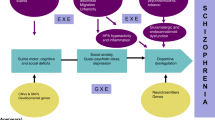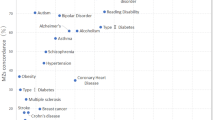Abstract
Schizophrenia is a serious neurodevelopmental disorder. Genetics is an important factor leading to schizophrenia, but its exact role is still unclear. Many studies have focused on neurotransmitters and regulators that participate in the processes mediated by these neurotransmitters. Alcohol dehydrogenase may not only catalyze the oxidation of retinol and ethanol but also be involved in a variety of neurotransmitter metabolic pathways. Therefore, our study investigated whether ADH7 gene variations in the Chinese Han population were associated with schizophrenia. Genomic DNA was extracted from a cohort of 275 schizophrenic patients (136 men and 139 women) and 313 healthy controls (160 men and 153 women) from the Northern Han Chinese population. The Hardy-Weinberg equilibrium test and linkage disequilibrium analysis were performed. Differences in genotypes, alleles, and haplotypes between the schizophrenic and control groups were determined using the chi-square test and correlation analysis. The distribution of the CC + TT genotype of rs284787 was statistically different between the case and control groups (p = 0.026, OR = 1.448); however, the difference disappeared after Bonferroni correction. Linkage analysis indicated that rs739147, rs284787, rs3805329, rs894369, rs3805331, and rs284786 were closely linked in one block. The haplotype analysis found no association between the composed haplotypes and the occurrence of schizophrenia. Our study showed that the ADH7 gene was not associated with the risk of schizophrenia. Additional studies with larger cohorts of different ethnicities are needed to validate our findings.

Similar content being viewed by others
Availability of Data and Materials
All data generated and analyzed during this study have been included in this published article.
References
Allali-Hassani A, Peralba JM, Martras S, Farres J, Pares X (1998) Retinoids, omega-hydroxyfatty acids and cytotoxic aldehydes as physiological substrates, and H2-receptor antagonists as pharmacological inhibitors, of human class IV alcohol dehydrogenase. FEBS Lett 426:362–366. https://doi.org/10.1016/s0014-5793(98)00374-3
Barrett JC, Fry B, Maller J, Daly MJ (2005) Haploview: analysis and visualization of LD and haplotype maps. Bioinformatics 21:263–265. https://doi.org/10.1093/bioinformatics/bth457
Buervenich S, Sydow O, Carmine A, Zhang Z, Anvret M, Olson L (2000) Alcohol dehydrogenase alleles in Parkinson’s disease. Mov Disord 15:813–818
Cabezas Silva R, Ribeiro T, Lucas I, Porto MJ, Costa Santos J, Dario P (2016) Analysis of 17 STR data on 5362 southern Portuguese individuals-an update on reference database. Forensic Sci Int Genet 21:e10–e12. https://doi.org/10.1016/j.fsigen.2015.11.007
Connor MJ, Sidell N (1997) Retinoic acid synthesis in normal and Alzheimer diseased brain and human neural cells. Mol Chem Neuropathol 30:239–252 doi:https://doi.org/10.1007/bf02815101
Edenberg HJ (2007) The genetics of alcohol metabolism: role of alcohol dehydrogenase and aldehyde dehydrogenase variants. Alcohol Res Health 30:5–13
Edenberg HJ et al (2006) Association of alcohol dehydrogenase genes with alcohol dependence: a comprehensive analysis. Hum Mol Genet 15:1539–1549. https://doi.org/10.1093/hmg/ddl073
Fan CC, McGrath JJ, Appadurai V, Buil A, Gandal MJ, Schork AJ, Mortensen PB, Agerbo E, Geschwind SA, Geschwind D, Werge T, Thompson WK, Pedersen CB (2018) Spatial fine-mapping for gene-by-environment effects identifies risk hot spots for schizophrenia. Nat Commun 9:5296. https://doi.org/10.1038/s41467-018-07708-7
Farres J et al (1994) Alcohol dehydrogenase of class IV (sigma sigma-ADH) from human stomach. cDNA sequence and structure/function relationships. Eur J Biochem 224:549–557. https://doi.org/10.1111/j.1432-1033.1994.00549.x
Kramvis A, Bukofzer S, Kew MC (1996) Comparison of hepatitis B virus DNA extractions from serum by the QIAamp blood kit, GeneReleaser, and the phenol-chloroform method. J Clin Microbiol 34:2731–2733
Li Q et al (2010) Detection of SNP-SNP interactions in trios of parents with schizophrenic children. Genet Epidemiol 34:396–406. https://doi.org/10.1002/gepi.20488
Liu Z, Sun Y, Jiang Y, Qian Y, Chen S, Gao S, Chen L, Li C, Zhou X (2018) Follicle-stimulating hormone (FSH) promotes retinol uptake and metabolism in the mouse ovary. Reprod Biol Endocrinol 16:52. https://doi.org/10.1186/s12958-018-0371-9
Luo X, Kranzler HR, Zuo L, Yang BZ, Lappalainen J, Gelernter J (2005) ADH4 gene variation is associated with alcohol and drug dependence: results from family controlled and population-structured association studies. Pharmacogenet Genomics 15:755–768. https://doi.org/10.1097/01.fpc.0000180141.77036.dc
Luo X, Kranzler HR, Zuo L, Wang S, Schork NJ, Gelernter J (2006) Diplotype trend regression analysis of the ADH gene cluster and the ALDH2 gene: multiple significant associations with alcohol dependence. Am J Hum Genet 78:973–987. https://doi.org/10.1086/504113
Luo X, Kranzler HR, Zuo L, Wang S, Schork NJ, Gelernter J (2007) Multiple ADH genes modulate risk for drug dependence in both African- and European-Americans. Hum Mol Genet 16:380–390. https://doi.org/10.1093/hmg/ddl460
Luo X, Kranzler HR, Zuo L, Zhang H, Wang S, Gelernter J (2008) ADH7 variation modulates extraversion and conscientiousness in substance-dependent subjects. Am J Med Genet B Neuropsychiatr Genet 147B:179–186. https://doi.org/10.1002/ajmg.b.30589
Martinez SE, Vaglenova J, Sabria J, Martinez MC, Farres J, Pares X (2001) Distribution of alcohol dehydrogenase mRNA in the rat central nervous system. Consequences for brain ethanol and retinoid metabolism. Eur J Biochem 268:5045–5056
Osier MV, Lu RB, Pakstis AJ, Kidd JR, Huang SY, Kidd KK (2004) Possible epistatic role of ADH7 in the protection against alcoholism. Am J Med Genet B Neuropsychiatr Genet 126B:19–22. https://doi.org/10.1002/ajmg.b.20136
Oze I et al (2009) Impact of multiple alcohol dehydrogenase gene polymorphisms on risk of upper aerodigestive tract cancers in a Japanese population. Cancer Epidemiol Biomarkers Prev 18:3097–3102. https://doi.org/10.1158/1055-9965.EPI-09-0499
Saha S, Chant D, Welham J, McGrath J (2005) A systematic review of the prevalence of schizophrenia. PLoS Med 2:e141. https://doi.org/10.1371/journal.pmed.0020141
Semple DM, McIntosh AM, Lawrie SM (2005) Cannabis as a risk factor for psychosis: systematic review. J Psychopharmacol 19:187–194. https://doi.org/10.1177/0269881105049040
Sharma RP (2005) Schizophrenia, epigenetics and ligand-activated nuclear receptors: a framework for chromatin therapeutics. Schizophr Res 72:79–90. https://doi.org/10.1016/j.schres.2004.03.001
Sullivan PF, Kendler KS, Neale MC (2003) Schizophrenia as a complex trait: evidence from a meta-analysis of twin studies. Arch Gen Psychiatry 60:1187–1192. https://doi.org/10.1001/archpsyc.60.12.1187
Varese F et al (2012) Childhood adversities increase the risk of psychosis: a meta-analysis of patient-control, prospective- and cross-sectional cohort studies. Schizophr Bull 38:661–671. https://doi.org/10.1093/schbul/sbs050
Vetreno RP, Hall JM, Savage LM (2011) Alcohol-related amnesia and dementia: animal models have revealed the contributions of different etiological factors on neuropathology, neurochemical dysfunction and cognitive impairment. Neurobiol Learn Mem 96:596–608. https://doi.org/10.1016/j.nlm.2011.01.003
Wan C et al (2009) Positive association between ALDH1A2 and schizophrenia in the Chinese population. Prog Neuropsychopharmacol Biol Psychiatry 33:1491–1495. https://doi.org/10.1016/j.pnpbp.2009.08.008
Wang K, Luo X, Zuo L (2014) Genetic factors for alcohol dependence and schizophrenia: common and rare variants, Aust J Drug Abuse Addict:1
Wolf G (1998) Vitamin A functions in the regulation of the dopaminergic system in the brain and pituitary gland. Nutr Rev 56:354–355. https://doi.org/10.1111/j.1753-4887.1998.tb01678.x
Yamamoto M, Drager UC, Ong DE, McCaffery P (1998) Retinoid-binding proteins in the cerebellum and choroid plexus and their relationship to regionalized retinoic acid synthesis and degradation. Eur J Biochem 257:344–350. https://doi.org/10.1046/j.1432-1327.1998.2570344.x
Zetterstrom RH, Simon A, Giacobini MM, Eriksson U, Olson L (1994) Localization of cellular retinoid-binding proteins suggests specific roles for retinoids in the adult central nervous system. Neuroscience 62:899–918. https://doi.org/10.1016/0306-4522(94)90482-0
Zheng Z, Zheng P, Zou X (2018) Association between schizophrenia and autism spectrum disorder: a systematic review and meta-analysis. Autism Res 11:1110–1119. https://doi.org/10.1002/aur.1977
Zuo L et al (2013a) Association between common alcohol dehydrogenase gene (ADH) variants and schizophrenia and autism. Hum Genet 132:735–743. https://doi.org/10.1007/s00439-013-1277-4
Zuo L et al (2013b) Rare ADH variant constellations are specific for alcohol dependence. Alcohol Alcohol 48:9–14. https://doi.org/10.1093/alcalc/ags104
Acknowledgements
We acknowledge all patients who participated in this study. We thank Xue Wu for her assistance in our work.
Funding
This work was supported by the National Natural Science Foundation of China (No. 81601653). The funding is owned and provided by Jun Yao. The funding body involved in the design of the study and the writing of the manuscript.
Author information
Authors and Affiliations
Contributions
K. Z. performed the experiments and data analysis and prepared the manuscript. K.Z., Y.L., M.G., Y.P.L., F.L.X., and X.X. participated in the sample collection. B.J.W. and J.Y. provided the experimental design ideas and guidance. All authors read and approved the final manuscript.
Corresponding authors
Ethics declarations
Conflict of Interest
The authors declare that they have no conflicts of interest.
Ethics Approval and Informed Consent
The experiments complied with the national guidelines and were approved by the Ethics Committee of China Medical University.
Consent to Participate
Each of the subjects or their relatives signed a written informed consent form before participating in this study.
Consent for Publication
Not applicable.
Additional information
Publisher’s Note
Springer Nature remains neutral with regard to jurisdictional claims in published maps and institutional affiliations.
Rights and permissions
About this article
Cite this article
Zeng, K., Li, Y., Gao, M. et al. Association of ADH7 Gene Polymorphism with Schizophrenia in the Han Population of Northern China: a Case-Control Study. J Mol Neurosci 70, 1851–1857 (2020). https://doi.org/10.1007/s12031-020-01578-9
Received:
Accepted:
Published:
Issue Date:
DOI: https://doi.org/10.1007/s12031-020-01578-9




